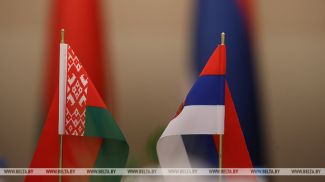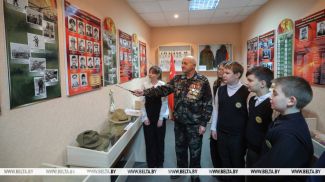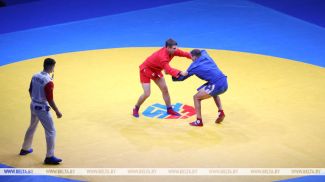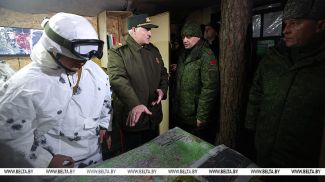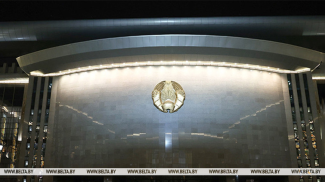The Belarus president visited Tajikistan and Kazakhstan in October. In comparison with the summits in Astana where Aleksandr Lukashenko made a number of bold statements and held several landmark meetings, his official visit to Dushanbe seemed like quite a mediocre event. No, multibillion-dollar contracts, global security issues and the war in Ukraine were not discussed there. At least in public. Nevertheless, this visit was not only an important event for Belarus-Tajikistan bilateral relations, but also a signal for other CIS countries. How so? The project After the Fact: Decisions of the First One offers the details.
Why is Tajikistan interesting for Belarus?
First, some background facts. Tajikistan is the smallest state in Central Asia in terms of territory. It borders on Afghanistan, China, Kyrgyzstan, and Uzbekistan. Tajikistan has rich mineral resources. Deposits of uranium, gold, silver, tungsten, bismuth, as well as high-quality marble were discovered there during the Soviet years. But their extraction is difficult due to underdeveloped infrastructure. By the way, China is interested in all of it now. It is unlikely that any country can compete with China there.
Why is Tajikistan interesting for Belarus? This is a small market, but in need of a wide variety of goods. Furthermore, the market welcomes Belarusians with open arms. It is an opportunity to enter the Afghan market, which needs products even more.
Why is Belarus interesting for Tajikistan? No, not due to the wide range of available products. Although it is a factor. But primarily due to the country's attitude. Belarus does not consider Tajikistan as a country where you can sell your goods quickly and at a high price. For Belarus Tajikistan is an equal partner, with which one can trade and set up joint manufacturing ventures. And penetrate third-country markets together.
Belarusian tractors, harvesters, and agricultural machines are already being assembled in Hissar District. Mogilev lifts are being produced in Khujand. An enterprise to make Vitebsk carpets is also being set up there. The production of dairy products in association with Minsk Dairy Plant is about to begin in Dushanbe. It is quite possible that Belarus will start developing the mining industry, metallurgical industry, and civil engineering industry in Tajikistan.
“It was the readiness of both sides to strengthen partnership and allied relations, deepen and advance contacts that had made it possible to give cooperation between Belarus and Tajikistan a special status of strategic interaction,” Aleksandr Lukashenko said during talks with the Tajikistan president.
How did Tajikistan greet Lukashenko?
A major Belarusian delegation had arrived in Dushanbe on the eve of the head of state's visit. The delegation consisted of ministers and businessmen representing interests of over 70 companies and enterprises. Belarusians set up a large-scale exhibition Made in Belarus in Tajikistan's capital. Contracts worth almost $50 million were signed at the business forum. Although the Belarusian side had much more modest expectations initially.
Mikhail Myatlikov, Chairman of the Belarusian Chamber of Commerce and Industry, said: “Virtually all the branches of the economy are represented. Those are machine building, metallurgy, food products, woodworking, light industry. For many it is the first meeting with their partners. We were looking for partners together with colleagues. I think it will produce results in the future.”
The Belarus president was welcomed in Dushanbe with open arms, too. Everything was as it should be during a meeting with an old friend: guard of honor, a military band and fanfares, national anthems, and strong handshakes. The heads of state discussed relations between countries, the complicated situation in the world and in the region face-to-face first and then in an expanded format. They were dissatisfied only with trade turnover. Last year it reached $126 million thanks to trade in defense and security products, but this year trade has halved without those goods. This is why the meeting ended with orders given to the Belarusian delegation.
“I have just asked members of our delegations, members of the government (it is a decent delegation) to make sure we do not return home empty-handed. And to make sure it is beneficial for the Tajik side,” Aleksandr Lukashenko told reporters after negotiations with Emomali Rahmon.
What did Belarus and Tajikistan agree on?
An official reception followed the official negotiations. And the next day, after Aleksandr Lukashenko held a number of meetings, Emomali Rahmon invited his Belarusian counterpart to a countryside house. He did not just invite Aleksandr Lukashenko, but personally went to the government residence where the head of state was staying to pick him up. From there the presidents went to the town of Takob, Varzob District.
By the way, the Belarusians did not fly to Minsk empty-handed indeed. In addition to agreements worth $50 million every member of the delegation received a mysterious gift from the president of Tajikistan. We can only guess what this small wooden box contains. But there were definitely melons on the return flight. Moreover, it turned out there were two reasons for it – one member of the delegation had a birthday that day.
So. Contracts worth tens of millions of U.S. dollars, a warm welcome and agreements on joint manufacturing. It will definitely be a boon for Belarusian-Tajik relations.
Tatiana Lugina, Chairwoman of the Belarusian state light industry concern Bellegprom, told BelTA: “We were invited to consider building a standard version of a factory for processing cotton to yarn and for processing yarn to fabric. The investments are quite decent, so we are considering how much the country can invest on the terms proposed by the Tajik side. Although I think and am absolutely convinced that we should consider the advisability of investing in their lands and cotton-based production (the Tajik side also suggests 100% capital investments).”
How are Lukashenko's visits to Tajikistan and Kazakhstan connected?
But why did we call this visit of Aleksandr Lukashenko to Dushanbe a signal for other CIS states? As it builds relations with other countries, Belarus constantly reminds of its position: "We have no closed topics. We will do everything we can for you."
The Belarusian government treats all nearby partners with equal respect. Even if they are being torn apart by contradictions. Even if someone is big and someone is small. Even if someone's pockets are full of strategic resources while someone else can only dream about it. There is something more in addition to respect. Belarusians see a nation, a people behind every state system.
“Our peoples resemble each other. I would even say they are identical: they are kind, hardworking, talented peoples. It is one of the reasons for our rather successful relations,” the Belarus president explained as he met with Chairman of the House of Representatives of the Supreme Assembly of Tajikistan Mahmadtoir Zokirzoda in Dushanbe.
Not everyone shares this approach in the Commonwealth of Independent States. This is why the CIS has lost Georgia and Ukraine. Relations with Moldova are breaking up. And everyone's “favorite” Western partners are successfully getting closer to the current participants of the organization. A long time ago Americans set their hearts on Tajikistan, which borders on Afghanistan. Hollywood smiles sparkle in Armenia, Kyrgyzstan, and Uzbekistan. Won't you grab a helping hand when one is offered to you? Exactly.
“We don't have 100 or 200 million people. But we want to be respected. Did we violate something? Did we say hello incorrectly? We have always respected interests of our key strategic partner. We want to be respected. Vladimir Vladimirovich [Putin], I'd like to ask you to make sure that Central Asia countries are not treated like the former Soviet Union. Just like now we witnessed the lack of attention to small republics, small peoples. Traditions and customs were disregarded. No support for growth was provided," these sincere concerns of the Tajikistan president during the Russia – Central Asia summit spread across the Internet like wildfire.
Emomali Rahmon's worries are fully justified, considering how much wealth is hidden in Tajikistan's depths. Tajikistan cannot extract everything on its own but is ready to share them. And then along comes the United States again.
About what did Aleksandr Lukashenko warn his colleagues in Astana?
The current situation is not today's problem. But one starts thinking about the consequences only now. Unfortunately, this is not enough. Time has been lost, which means one has to take strides to catch up. Aleksandr Lukashenko warned about this at a CIS summit in Astana.
“I think that everyone here understands that true goals of Western strategists are much more ambitious. They want to split Eurasian space according to influence sectors and use our countries as mere suppliers of raw materials and industrial colonies. We have to be ready for all kinds of provocations along the entire perimeter of the CIS. Everyone's tenacity will be put to test. Regretfully, I have to acknowledge the absence of mutual support in a number of cases for now,” the Belarusian leader stated at a meeting of the CIS heads of state.
Why does the Belarus president not get tired of repeating it? The West tried to welcome Belarus into its fold literally several years ago. You must remember all those visits of U.S. officials to Belarus. This bubble burst very quickly. Fortunately for Belarus the Americans turned out to be short-sighted and impatient. Or they simply picked a wrong target. After they quickly put aside their Hollywood smiles, they bared their teeth and everything fell into place.
And it's not just about the post-Soviet space. We have already said in previous episodes of the project After the Fact: Decisions of the First One that that the ultimate goal is China. Aleksandr Lukashenko believes that it is time for Asia to become a single entity and jointly confront problems. But with deeds, not words.
The head of state also spoke about it in Astana at a summit of the Conference on Interaction and Confidence Building Measures in Asia: “The chain of conflicts that has shaken the Old World has already reached Asia. Moreover, the Western countries offering their peacemaking services only add fuel to the fire and are not interested in de-escalation. Their goal is to get everyone to quarrel, to separate from each other, to get uncontrolled access to markets and resources. As part of greater Eurasia Belarus cannot ignore the current state of affairs in the region. I am convinced that time has come to pool our efforts and jointly confront the problems that we have encountered and that we cannot overcome alone. All conventionalities, protectionism, and national egoism should become a thing of the past.”
If someone thinks that the Conference on Interaction and Confidence Building Measures in Asia is just a small get-together party for Asians, they just have to look at the level of contacts of the Belarusian president. During the summit Aleksandr Lukashenko held negotiations with the leaders of Kazakhstan, Türkiye, and Pakistan. He talked to the vice president of the People's Republic of China, the emir of Qatar, and the president of Kyrgyzstan. These meetings were an opportunity to not only compare notes in bilateral relations, but also to feel the nerve of the planet as the president put it. In other words, to understand what is happening to the system of world relations in order to integrate Belarus into it.
We cannot predict and don't want to hazard a guess as to how the situation will develop in the near future. We know only one thing: countries need to listen and hear each other. Follow the example of Belarus.
***The project has been created using the target levy for the production of national content.




